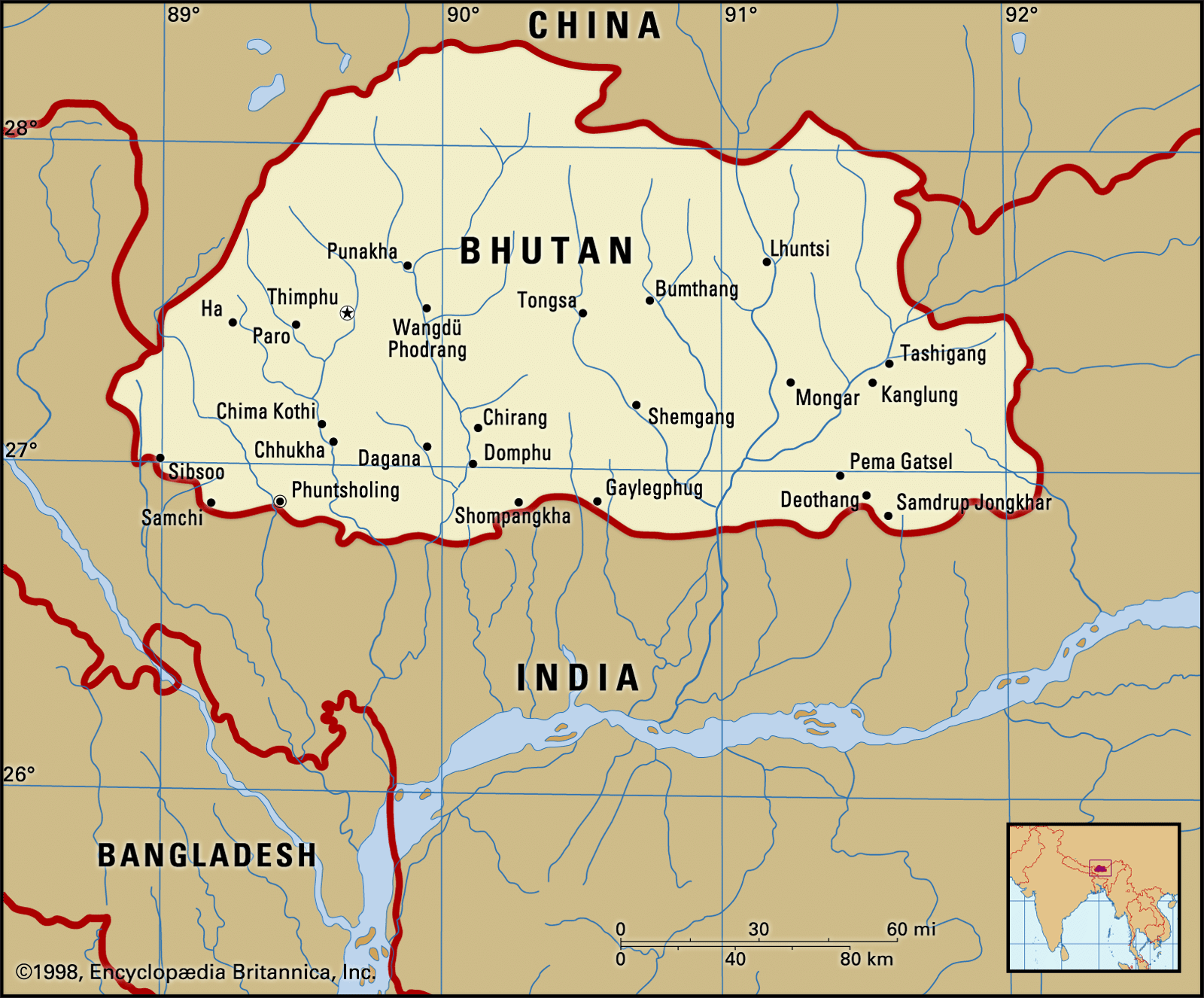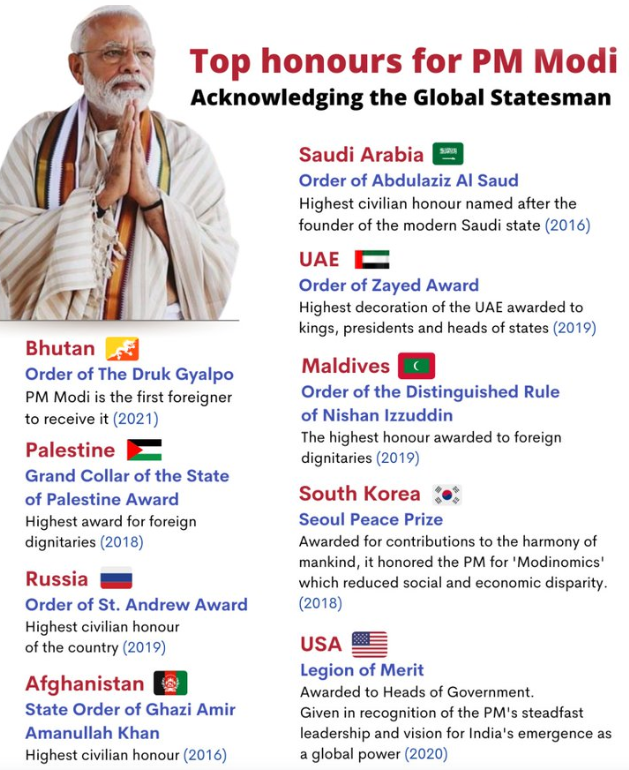International Relations
Order of the Druk Gyalpo
- 28 Mar 2024
- 8 min read
For Prelims: Order of the Druk Gyalpo, Food Safety and Standards Authority Of India (FSSAI), Star labelling program, Self-Reliance.
For Mains: Order of the Druk Gyalpo, Regional and global groupings and agreements involving India and/or affecting India’s interests.
Why in News?
Recently, the Prime Minister of India received Bhutan’s highest civilian award, the ‘Order of the Druk Gyalpo’, during his two-day State visit to Bhutan.
- He is the first foreign Head of the Government to receive the honour.
- India and Bhutan have also exchanged several MoUs and signed agreements in the fields of energy, trade, digital connectivity, space and agriculture, and finalised the MoU on the establishment of rail links between the two nations.
What is the ‘Order of the Druk Gyalpo’ Award?
- About:
- The Order of the Druk Gyalpo stands as Bhutan’s most esteemed civilian accolade, reserved for individuals who have demonstrated exceptional contributions to society, embodying values of service, integrity, and leadership.
- Recipients of this prestigious award are carefully selected based on their outstanding accomplishments and positive impact on society.
- Their contributions are assessed in alignment with Bhutanese values, emphasising holistic development, cultural preservation, and regional harmony.
- Accolade on Indian PM:
- Indian PM’s selection as the first foreign Head of Government to receive this honour underlined the strong bilateral ties between the two countries.
- The award underscores his leadership, characterised by an unwavering commitment to progress, which aligns closely with Bhutan’s national vision of achieving Self-Reliance.
- Indian PM has emerged as a figure of destiny, transforming the ancient civilisation of India into a dynamic centre of technology and innovation.
- His commitment to safeguarding the environment and investing in renewable energy makes India’s progress truly well-rounded.
What are the Key Pacts Signed by India and Bhutan?
- Establishment of Rail Links:
- An MoU was finalised on the establishment of rail links between India and Bhutan, including the Kokrajhar-Gelephu rail link and Banarhat-Samtse rail link.
- Petroleum, Oil, Lubricants (POL):
- An agreement was made for the general supply of POL and related products from India to Bhutan, facilitating supply through agreed entry/exit points.
- Recognition of Bhutan Food And Drug Authority (BFDA):
- An agreement was reached for the recognition of official control exercised by BFDA by the Food Safety and Standards Authority Of India (FSSAI), promoting ease of doing business and reducing compliance costs.
- Cooperation in Energy Efficiency and Energy Conservation:
- An MoU aimed to assist Bhutan in enhancing energy efficiency in the household sector through various measures such as promoting a star labelling program and institutionalising training of energy auditors.
- Pharmacopoeia, Vigilance, and Testing of Medicinal Products:
- This MoU aimed to enhance cooperation and exchange information in the regulation of medicines, allowing for the acceptance of Indian Pharmacopoeia by Bhutan and the supply of generic medicines at affordable prices.
- Joint Plan of Action (JPOA) on Space Cooperation:
- A concrete roadmap was established for further developing space cooperation through exchange programs and training.
- Digital Connectivity:
- Both countries signed for renewal of the MoU on Peering Arrangement between the National Knowledge Network of India (NKN) and the Druk Research And Education Network of Bhutan.
- This MoU aims to enhance digital connectivity between India and Bhutan and will benefit the scholars and research institutions of Bhutan.
What are the Implications of Indian PM’s Visit to Bhutan at a Time of Regional Challenges?
- Strengthening Bilateral Ties:
- The visit underscores India's commitment to strengthening its bilateral relationship with Bhutan, especially during a period of regional uncertainty and challenges.
- This reaffirms the enduring friendship between the two nations and emphasises mutual support in the face of external pressures.
- The announcement of India’s doubling of support for Bhutan’s Five Year Plan, from Rs 5,000 crore to Rs 10,000 crore, was significant in this regard.
- Counterbalancing Chinese Influence:
- Against the backdrop of China's increasing engagement with Bhutan, the Indian PM’s visit serves to reinforce India's presence and influence in the region.
- By showcasing support for Bhutan's development and security interests, India aims to counterbalance any attempts by China to expand its influence in Bhutan.
- Enhancing Strategic Cooperation:
- The visit included discussions on strategic cooperation, including defence and security cooperation, to address common regional challenges such as border security and terrorism.
- Strengthening cooperation in these areas can contribute to regional stability and security.
- Promoting Economic Partnerships:
- The visit has also focused on promoting economic partnerships between India and Bhutan. This could involve initiatives to boost trade, investment, and infrastructure development, which are essential for both countries' economic growth and development.
- Addressing Regional Security Concerns:
- Given the geopolitical dynamics in South Asia, the Indian PM’s visit has addressed regional security concerns, including cross-border terrorism and the need for cooperation among neighbouring countries to maintain peace and stability in the region.
Way Forward
- Both countries should continue to emphasise the unbreakable nature of their ties and demonstrate a united front, especially in the face of external challenges. This solidarity is crucial for preserving the permanence of their relationship amidst regional changes and uncertainties.
- India should reaffirm its support for Bhutan's interests, particularly in the context of boundary talks with China. India needs to stand by Bhutan and ensure that its sovereignty and territorial integrity are upheld during negotiations.
- Enhancing communication and coordination between India and Bhutan's diplomatic and security establishments is vital. This includes sharing intelligence, conducting joint assessments, and formulating unified strategies to address common challenges, particularly those related to regional security.
Read more: India Bhutan Relations, Bhutan’s Gelephu Gambit
UPSC Civil Services Examination, Previous Year Question (PYQ)
Mains
Q. Border management is a complex task due to difficult terrain and hostile relations with some countries. Elucidate the challenges and strategies for effective border management. (2016).






